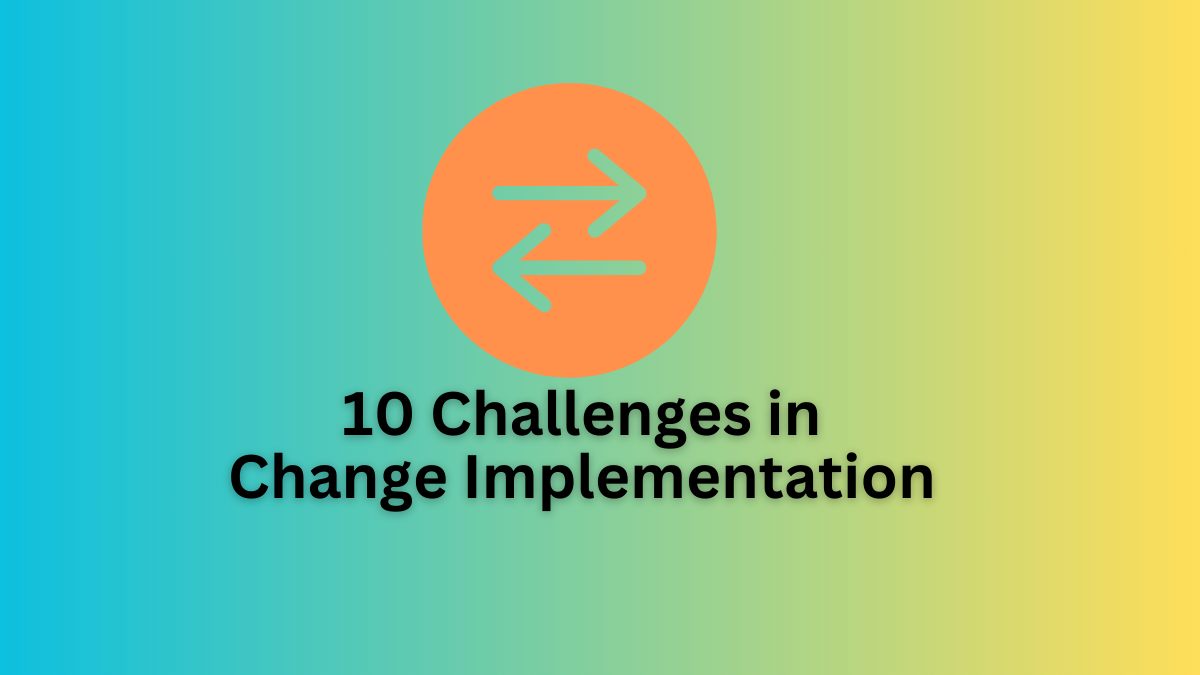Challenges and Strategies TO Implement Change
Change is necessary in the organization, but is not easy. While implementing it, management has to face various challenges. In this article, we will explore the common challenges in change implementation in the organization and strategies to overcome them.
Challenges in Change Implementation
The following are the 10 challenges in change implementation in the workplace:
Resistance to Change
One of the most significant challenges in change implementation is resistance from employees. This resistance stems from fear of the unknown, concerns about job security, and reluctance to adapt to new ways of working.
Lack of Clear Communication
Inadequate communication about the reasons for change, the expected outcomes, and the impact on employees can lead to confusion and resistance. Without clear communication channels, employees may feel disconnected and uncertain about the changes.
Conflict in Roles and Responsibilities
Changes in organizational structures or processes can create confusion and conflict among employees regarding their roles and responsibilities. This can lead to inefficiencies and resistance to change.
Differences in Personalities and Values
Variations in personalities and values among employees may result in different attitudes toward change. Some employees may embrace change readily, while others may resist it due to personal preferences or beliefs.
Organizational Culture
The existing organizational culture may be resistant to change, making it challenging to implement new initiatives. Cultural norms and traditions can act as barriers to change, requiring careful navigation by management.
Read More: 10 Challenges in Organizational Communication
Lack of Leadership Support
Without strong leadership support, change initiatives are less likely to succeed. Leaders play a crucial role in setting the tone for change, motivating employees, and addressing resistance effectively.
Resource Constraints
Limited resources, including time, budget, and manpower, can hinder the implementation of change initiatives. Without adequate resources, organizations may struggle to execute plans effectively and sustain changes over time.
Fear of Failure
Employees may fear the potential consequences of change, such as job loss or decreased job satisfaction. This fear can lead to resistance and reluctance to participate in change initiatives.
Inadequate Training and Development
Lack of training and development opportunities for employees can hinder their ability to adapt to change. Without the necessary skills and knowledge, employees may struggle to implement new processes or technologies effectively.
Read More: 10 Challenges in Controlling
Overcoming Past Failures
Previous unsuccessful change initiatives can create skepticism and reluctance among employees. Overcoming negative perceptions and building trust in new change efforts can be challenging but essential for success.
Strategies to Overcome Challenges in Change Implementation
The following are the 10 strategies to overcome the challenges of change implementation in the workplace:
Effective Communication
Establish clear and open communication channels to convey the rationale for change, address concerns, and provide regular updates on progress. Engage employees in dialogue and solicit feedback to ensure their voices are heard.
Leadership Involvement
Ensure strong leadership support and involvement throughout the change process. Leaders should communicate the vision for change, demonstrate commitment, and lead by example to inspire confidence and trust among employees.
Change Management Training
Provide comprehensive training and development opportunities to equip employees with the skills and knowledge needed to adapt to change effectively. Offer resources, workshops, and coaching to support employees through the transition.
Read More: 10 Challenges in Management Information Systems
Cultural Transformation
Foster a culture of continuous improvement and innovation that embraces change as a necessary part of growth. Encourage collaboration, experimentation, and learning to create a dynamic and adaptive organizational culture.
Resource Allocation
Allocate sufficient resources, including time, budget, and manpower, to support change initiatives. Prioritize investments based on the strategic importance of the changes and the expected return on investment.
Empowering Employees
Empower employees to take ownership of change initiatives by involving them in decision-making processes and delegating responsibility. Provide autonomy, support, and recognition to encourage participation and commitment.
Addressing Resistance
Identify and address sources of resistance early in the change process. Offer incentives, reassurance, and opportunities for involvement to mitigate resistance and build momentum for change.
Read More: 10 Challenges in Quality Management
Learning from Past Failures
Acknowledge past failures and learn from them to inform future change efforts. Conduct post-mortem analyses, gather feedback, and adjust strategies accordingly to avoid repeating the same mistakes.
Flexibility and Adaptability
Remain flexible and adaptable in response to changing circumstances and feedback. Be willing to revise plans, experiment with new approaches, and pivot as needed to achieve desired outcomes.
Celebrating Successes
Recognize and celebrate milestones and achievements along the change journey to boost morale and motivation. Highlight the positive impact of change on individuals and the organization as a whole to reinforce commitment and momentum.
Hence, these are the 10 challenges in change implementation and strategies to overcome those challenges.
